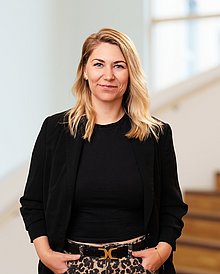First insights into the 2025 Bundestag election: UW/H's “Zweitstimme.org” project provides precise forecasts
Prof. Dr. Lukas Stötzer and a team of researchers analyze the election results.

In just under a month, Germany will elect a new Bundestag and the forecasts promise an exciting election evening on 23 February. Prof. Dr Lukas Stötzer from Witten/Herdecke University (UW/H) is an expert in election forecasting and political behaviour. Together with researchers from the Hertie School Berlin and the University of Mannheim, he is working on the "Zweitstimme.org" project to predict the outcome of elections at federal and constituency level.
"Scientific election forecasts can give voters an indication of which majorities are possible and which parties could make it into parliament," explains Stötzer. "This year will be particularly exciting due to the effects of the electoral law reform, which could lead to constituencies without a direct mandate being represented in the Bundestag for the first time."
This reform changes the distribution of seats in the Bundestag by limiting overhang mandates and restricting the number of MPs to a fixed maximum of 630. This could lead to candidates in some constituencies entering parliament without a direct mandate, which will influence the composition of the Bundestag and the formation of majorities.
The team at Zweitstimme.org is conducting extensive online surveys with citizens, journalists and constituency candidates for this year's Bundestag elections. Among other things, they will be asked about their assessments, behaviour and attitudes towards the election. The results are incorporated into detailed forecasts that show both the nationwide result and the status in the individual constituencies, updated daily.
In addition to forecasting the election result, the research team also analyses the social and political impact of election polls. "Our work is not only intended to provide predictions, but also to contribute to how election forecasts can be communicated in a transparent and understandable way," says Stötzer. "It is important that polls are not misunderstood or misinterpreted - they can enrich the political decision-making process without having a manipulative effect."
The project, which is funded by the German Research Foundation, also sheds light on how polls and forecasts influence election campaigns and the strategic decisions of political parties. Hundreds of journalists as well as constituency candidates and their teams have already been interviewed for this purpose.
Photos for download
Contact person

Svenja Malessa
Press Officer
Administration | Communication & Marketing
Alfred-Herrhausen-Straße 48
58455 Witten
Room number: 2.F05
